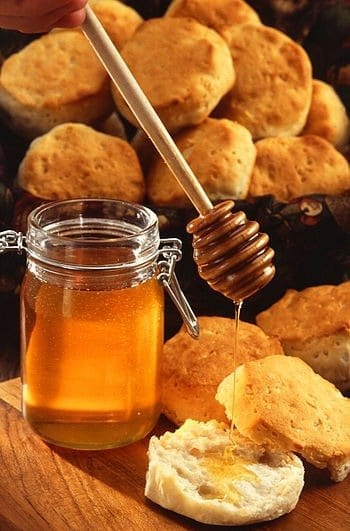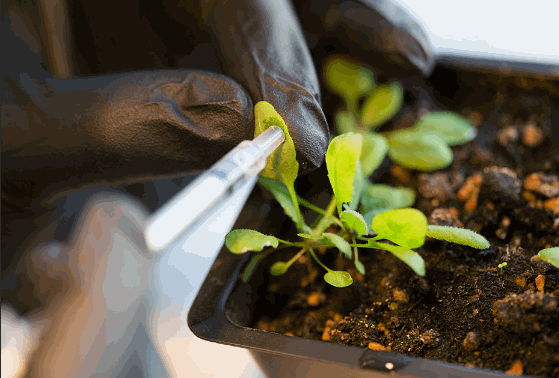
Honey, that delectable condiment for breads and fruits, could be one sweet solution to the serious, ever-growing problem of bacterial resistance to antibiotics, researchers said here today.
Medical professionals sometimes use honey successfully as a topical dressing, but it could play a larger role in fighting infections, the researchers predicted. Their study was part of the 247th National Meeting of the American Chemical Society (ACS), the world’s largest scientific society.
The meeting, attended by thousands of scientists, features more than 10,000 reports on new advances in science and other topics. It is being held at the Dallas Convention Center and area hotels through Thursday.
“The unique property of honey lies in its ability to fight infection on multiple levels, making it more difficult for bacteria to develop resistance,” said study leader Susan M. Meschwitz, Ph.D. That is, it uses a combination of weapons, including hydrogen peroxide, acidity, osmotic effect, high sugar concentration and polyphenols — all of which actively kill bacterial cells, she explained. The osmotic effect, which is the result of the high sugar concentration in honey, draws water from the bacterial cells, dehydrating and killing them.
In addition, several studies have shown that honey inhibits the formation of biofilms, or communities of slimy disease-causing bacteria, she said. “Honey may also disrupt quorum sensing, which weakens bacterial virulence, rendering the bacteria more susceptible to conventional antibiotics,” Meschwitz said. Quorum sensing is the way bacteria communicate with one another, and may be involved in the formation of biofilms. In certain bacteria, this communication system also controls the release of toxins, which affects the bacteria’s pathogenicity, or their ability to cause disease.
Meschwitz, who is with Salve Regina University in Newport, R.I., said another advantage of honey is that unlike conventional antibiotics, it doesn’t target the essential growth processes of bacteria. The problem with this type of targeting, which is the basis of conventional antibiotics, is that it results in the bacteria building up resistance to the drugs.
Honey is effective because it is filled with healthful polyphenols, or antioxidants, she said. These include the phenolic acids, caffeic acid, p-coumaric acid and ellagic acid, as well as many flavonoids. “Several studies have demonstrated a correlation between the non-peroxide antimicrobial and antioxidant activities of honey and the presence of honey phenolics,” she added. A large number of laboratory and limited clinical studies have confirmed the broad-spectrum antibacterial, antifungal and antiviral properties of honey, according to Meschwitz.
She said that her team also is finding that honey has antioxidant properties and is an effective antibacterial. “We have run standard antioxidant tests on honey to measure the level of antioxidant activity,” she explained. “We have separated and identified the various antioxidant polyphenol compounds. In our antibacterial studies, we have been testing honey’s activity against E. coli, Staphylococcus aureus and Pseudomonas aeruginosa, among others.”
The Latest on: Honey antioxidant antibacterial
[google_news title=”” keyword=”Honey antioxidant antibacterial” num_posts=”10″ blurb_length=”0″ show_thumb=”left”]
via Google News
The Latest on: Honey antioxidant antibacterial
- Freshness matters: Study finds newer honey packs a stronger antibacterial punchon May 8, 2024 at 8:23 pm
Researchers reveal that the antibacterial potency of Hungarian honeys, including their effectiveness against respiratory pathogens, declines with storage time, emphasizing the need for fresh sources ...
- Honey or jaggery: Which one is healthier?on May 8, 2024 at 7:30 pm
And how far are honey and jaggery good for health? Let us weigh in. Why should one avoid carbonated sugar? Carbonated sugar, also known as processed or refined sugar, is a source of empty calories.
- Mayo Clinic Q and A: Can Honey Help My Cough?on May 5, 2024 at 2:04 am
My family’s colds are still lingering from the winter season, and I can’t seem to kick this pesky cough. I’ve heard honey can help. Is it true? ANSWER: While we make think of honey as a pantry staple ...
- Distressed By Cough And Cold? These Natural Remedies Might Helpon May 3, 2024 at 1:08 am
Explore effective home remedies for cough relief including ginger tea, honey and lemon, steam inhalation, turmeric milk, peppermint, apple cider vinegar, and eucalyptus oil.
- Can You Use Honey to Treat Acid Reflux?on April 28, 2024 at 5:00 pm
This honey may have other antibacterial properties along with its natural hydrogen peroxide. Honey may work in several ways to help lower acid reflux symptoms. While there aren’t enough large ...
- Top 8 Best Oils for Eczema in 2024on April 22, 2024 at 3:20 am
The ECZEMA HONEY Antioxidant Body Oil is easy to use ... Tea tree oil is a popular essential oil that is known for its antibacterial and anti-inflammatory properties. Some individuals with ...
- What to Know About Manuka Honey for Psoriasison April 18, 2024 at 5:00 pm
Research suggests it has more antioxidant, antimicrobial, and antibacterial properties than other honey. For example, it has demonstrated the ability to fight infection with methicillin-resistant ...
- 4 Undeniable Benefits of Honeyon December 20, 2023 at 2:36 pm
Its antibacterial and antifungal properties effectively ... making it a comforting and effective home remedy during cold and flu season. Antioxidant Support Honey is loaded with antioxidants essential ...
- UTSA professor offers hands-on experiences to teach honey’s healing powerson September 14, 2022 at 5:00 pm
“Honey has been used as an antibacterial solution for thousands of years ... With its anti-inflammatory, anti-bacterial, antioxidant and anti-aging properties, honey is effective as a treatment for ...
via Bing News










